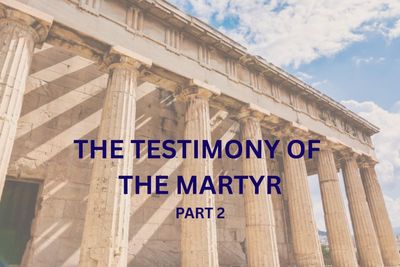The Testimony of a Martyr (Part 2)
Picking up where we left off last month,
“Brothers and fathers, listen now to my defense before you.” When they heard that he was addressing them in Aramaic, they became even quieter. He continued, “I am a Jew, born in Tarsus of Cilicia but brought up in this city, educated at the feet of Gamaliel according to the strictness of our ancestral law. I was zealous for God, just as all of you are today. I persecuted this Way to the death, arresting and putting both men and women in jail, as both the high priest and the whole council of elders can testify about me. After I received letters from them to the brothers, I traveled to Damascus to arrest those who were there and bring them to Jerusalem to be punished.” (Acts 22:1-5)
Paul is courageous and clearly articulates how Christ drew him to salvation. He also explains his attempts to follow God’s will and do God’s work. In the face of murderous mobs and cruel interrogations of Rome, he remains calm and clear, knowing the will of God will be carried out. From this we learn courage, clarity of witness, and commitment to God’s call on our life…even to the point of martyrdom! Let’s break down the different aspects of Paul’s identity…an identity that earned him the right to be called a martyr for the faith!
Paul speaks about being a Pharisee. The worst enemy of the church may use his or her experiences for God’s kingdom after God has brought them to salvation! As a Pharisee, Paul speaks about his heritage. He answered the charge “You are a Jewish apostate” by casting his life in a completely Jewish context with a special emphasis on God’s direct revelation. Paul was a witness on trial for the gospel, and Luke devotes the remainder of his book to his message. Paul speaks about his education. His reference to formal training under Gamaliel is the credential that would have certified his legitimacy in Jewish scholarship. Paul speaks about his religious zeal. Being from Tarsus, Paul was a Jew without Palestinian roots, a maverick from the Hellenistic world. He had to overcome the false image that he was a confused Hellenist with Jewish theology tainted by the outside world. Today, your credentials may not constitute the message you have…but they might help secure a hearing.
God not only saves people through Christ, but he also gives them a mission for life and provides the Holy Spirit’s power to accomplish that mission. What happened in your life before you became a Christian to prepare you for more effective ministry? What is the difference between loyal church membership and being a Christian? In describing your conversion experience, for what mission has God chosen for
you, as he saved you?
“As I was traveling and approaching Damascus, about noon, an intense light from heaven suddenly flashed around me. 7 I fell to the ground and heard a voice saying to me, ‘Saul, Saul, why are you persecuting me? ’ “I answered, ‘Who are you, Lord? ’ “He said to me, ‘I am Jesus of Nazareth, the one you are persecuting.’ 9 Now those who were with me saw the light, but they did not hear the voice of the one who was speaking to me. “I said, ‘What should I do, Lord? ’ “The Lord told me, ‘Get up and go into Damascus, and there you will be told everything that you have been assigned to do.’ “Since I couldn’t see because of the brightness of the light, I was led by the hand by those who were with me, and went into Damascus. Someone named Ananias, a devout man according to the law, who had a good reputation with all the Jews living there, came and stood by me and said, ‘Brother Saul, regain your sight.’ And in that very hour I looked up and saw him.” (Acts 22:6-13)
Paul describes himself as a true believer. People may doubt your theology, but your own story of personal conversion is the heart of convincing testimony – especially when you back it up by godly living. The light on the road to Damascus appeared at noon – something Luke didn’t tell us in chapter 9 – a light strong enough to outshine the midday sun. “What shall I do Lord?” – also not in chapter 9, but acknowledging that Jesus fulfilled the OT prophesies, equating him with Yahweh of the OT, and the Lord of the Hebrews. See Paul the witness! When God brings you to the point of faith, He already knows how He is going to use you in His service, regardless of your understanding or resistance to said plan. Paul was selected by God, warned through prayer (Acts 22:17-18), and sent to the Gentiles. See Paul the prisoner. (vv.22-30) When everything turns against you and there seems to be no hope of escape, God has not abandoned you and will work out his plan for your life!
See Paul the citizen.1 When he said “Gentiles”, all receptivity to his speech ended. Being on equal footing with the Jews was intolerable. The mob went from “away with him” (21:36) to “Rid the earth of him! He’s not fit to live!” (22:22). Throwing their cloaks was a gesture of horror at blasphemy, preparing for stoning, ridding themselves of contamination of blasphemy, or just collective outrage. And the centurion had no option but to immediately report this to his commander, who reacted immediately to the miscarriage of justice. Whereas the centurion had purchased citizenship for a big price, Paul was born a citizen. A crime had already been committed in putting Paul in chains. To have him scourged with the flagellum was unthinkable, since he knew not who he was or any crime for which he was guilty. Most likely, one of Paul’s ancestors received Roman citizenship for valuable services rendered to a Roman administrator or general in northern Palestine or the Tarsus area. Lysias had avoided the crime of scourging but still held a Roman citizen in custody. He could argue that it was protective custody in that he had saved Paul from the Jewish mob. He pondered the situation overnight and the next morning ordered the meeting of the Sanhedrin. If Paul were a devout Jew, surely they could get the truth out of him. Luke’s original readers are accustomed to the Sanhedrin. They heard a witness from the apostles (4:15; 5:21), from Stephen (6:12, 15), and
now Paul. What is about to unfold covers 6 chapters in Acts and 4 years of Paul’s life. Through it all, he stands firm and bold, arguing consistently that he is a good Jew, and the logical outcome of that is to accept the Messiahship of Jesus. God not only saved you through Christ, but, like Charlie Kirk, He has also given you a mission for life and has provided the Holy Spirit and His power to accomplish your mission. What happened in your life before you became a Christian to prepare you for more effective Christian ministry? What is the difference between loyal church membership and being a Christian? In describing your conversion experience, what mission has God chosen for you? Whether as martyr or not, what is your testimony?
In His Service,
James


